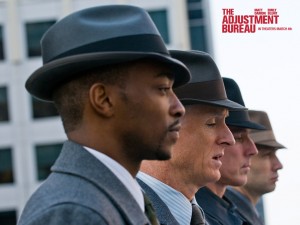(ThyBlackMan.com) I went to see “The Adjustment Bureau,” the new film starring Matt Damon and Anthony Mackie. Mackie has become one of my favorite actors as of late after taking some very bold and promising stands on how black Hollywood can address the racism they are constantly facing from the white Hollywood establishment. Rather than standing around moaning about the inequities of their profession, Mackie has simply said that we need to stand up and start creating our own films. I love what Mackie had to say, because you can never gain anyone’s respect by begging.
With that being said, I have to say that the new Mackie/Damon film (Mackie didn’t make this one), “The Adjustment Bureau” really made me think about life. To give a short summary, the film talks about paths that we are “scheduled” to take in life and how most of us are afraid to deviate from those paths. You grow up with a father who tells you to become an engineer,  so you become one. You went to school to be a medical doctor or attorney, so you practice in the profession for life, even if you hate it. You believe that at a certain age, you’re supposed to get married, have kids, buy a house and get a “respectable” job, so you do it. No questions asked, and no serious contemplation necessary.
so you become one. You went to school to be a medical doctor or attorney, so you practice in the profession for life, even if you hate it. You believe that at a certain age, you’re supposed to get married, have kids, buy a house and get a “respectable” job, so you do it. No questions asked, and no serious contemplation necessary.
What’s unfortunate is that many of us in the black community allow others to define our paths for us, and those paths typically lead us right into the jaws of corporate slavery. Rather than getting educated so that we can empower ourselves to lift our communities, we are taught that education is meant to position you as a corporate monkey, doing meaningless work for 40 years so you can get a gold watch at retirement. Then, after all the success, the money, the cars and the bling, we find that our lives are empty of meaning, purpose or true achievement. The company to whom we’ve dedicated our lives replaces us within a week, and less than a year after we’re gone, no one remembers that you were the nice black man in cubicle number seven. We’ve lived and died and the world never knew we were even here.
I watched the Mackie/Damon film with my eyes wide open, primarily because it reminded me of my own “scheduled plan,” from which I deviated significantly. As a promising young doctoral student, I’d gained a tremendous amount of esteem from my professors as one of the few black men on earth to get a PhD in Finance. My plan had been laid out for me by my academic advisor, who I thought (at the time) to be an incredibly accomplished man. He was the kind of scholar with whom people would spend 20 years hoping to have just one conversation. In other words, he was a certified “big shot.”
One day, after having an especially difficult time in my program, I had a moment of clarity. I looked at my tired, overworked advisor, and simply asked myself: “If I have the same degree of success over my career that he’s had, will I be happy with my life?” Unfortunately, the answer was a clear and resounding “no.” I realized, at that moment, that by trying to match his achievements, I would be fulfilling someone else’s dream, not my own. Making matters worse, I would have ended up like legions of other African American PhDs, many of whom are trained to believe that we are doing something meaningful by sitting at predominantly white universities writing research papers that no one is ever going to read. All the while, our communities are in dire need of our expertise to solve critical social problems that are literally killing us.
After having my revelation, I decided to take off the shackles and leave the plantation. It was scary, because by revealing myself to be a socially-committed black man, I immediately lost favor with the academic advisors who once loved me so much. I was also regularly punished at Syracuse University for doing work in the black community that my colleagues don’t consider to be “academically important.” The truth, however, is that they don’t consider my work to be academically important because we as a society have decided that black people themselves are not important. That’s why esteemed scholars such as Cornel West and Michael Eric Dyson also receive second-class treatment by the academic establishment.
What matters in the end is having pride in what you do and knowing in your heart that your work is meaningful. I can personally testify that in spite of the backlash I’ve received on this academic rollercoaster ride, I wouldn’t change my outcomes for the world. I’ve had amazing experiences that I never would have had by staying on the path that had been chosen for me, and I’ve had the ability to reach millions of people I never would have been able to reach by sitting inside a classroom and running away from my destiny. The point in all this is to say that you should never be afraid to be who you are meant to be, and we can’t allow others to write our story for us. Life is too short to be afraid.
Written By Dr. Boyce Watkins
Official website; http://boycewatkins.com/

















Leave a Reply